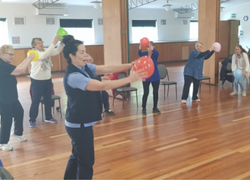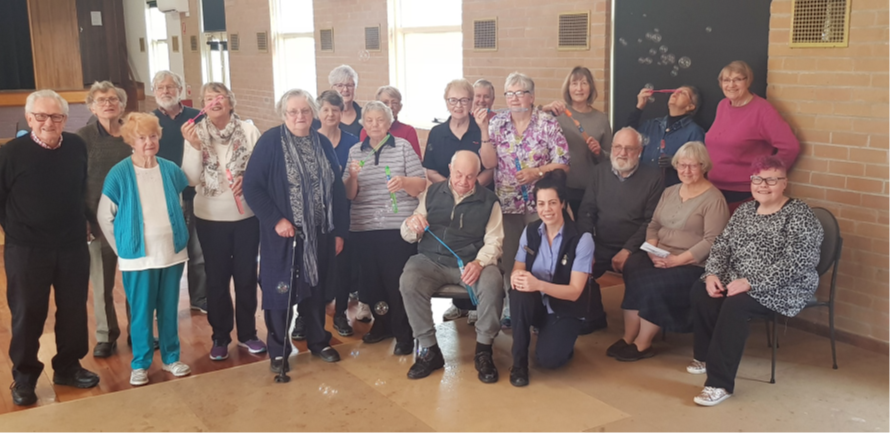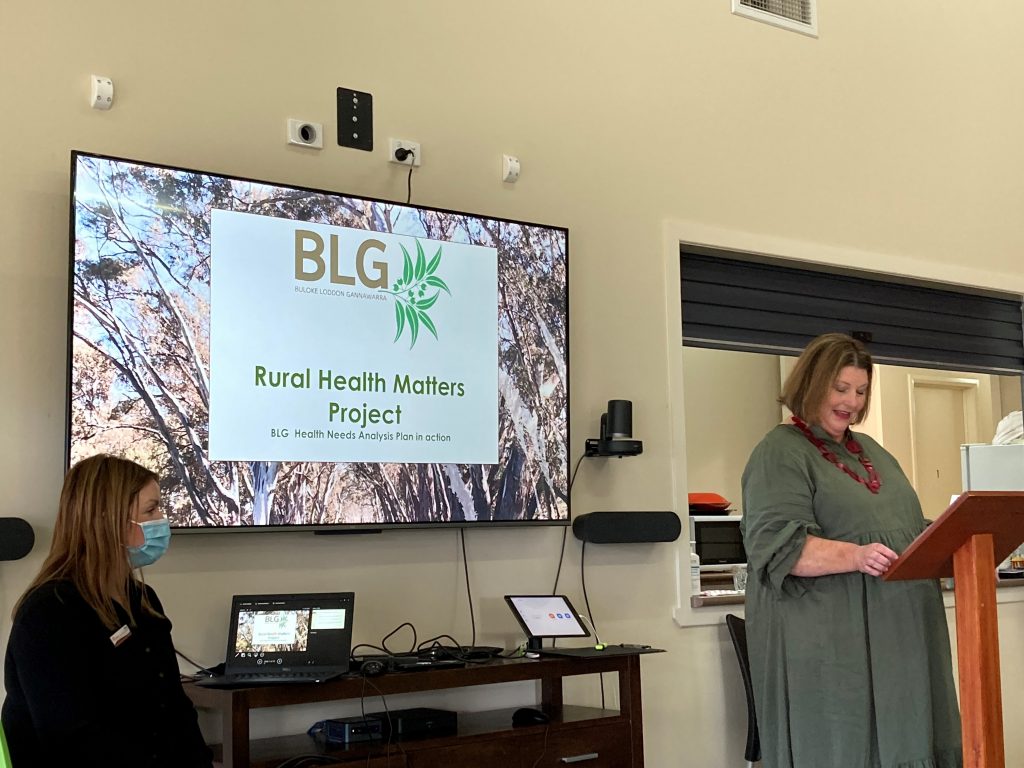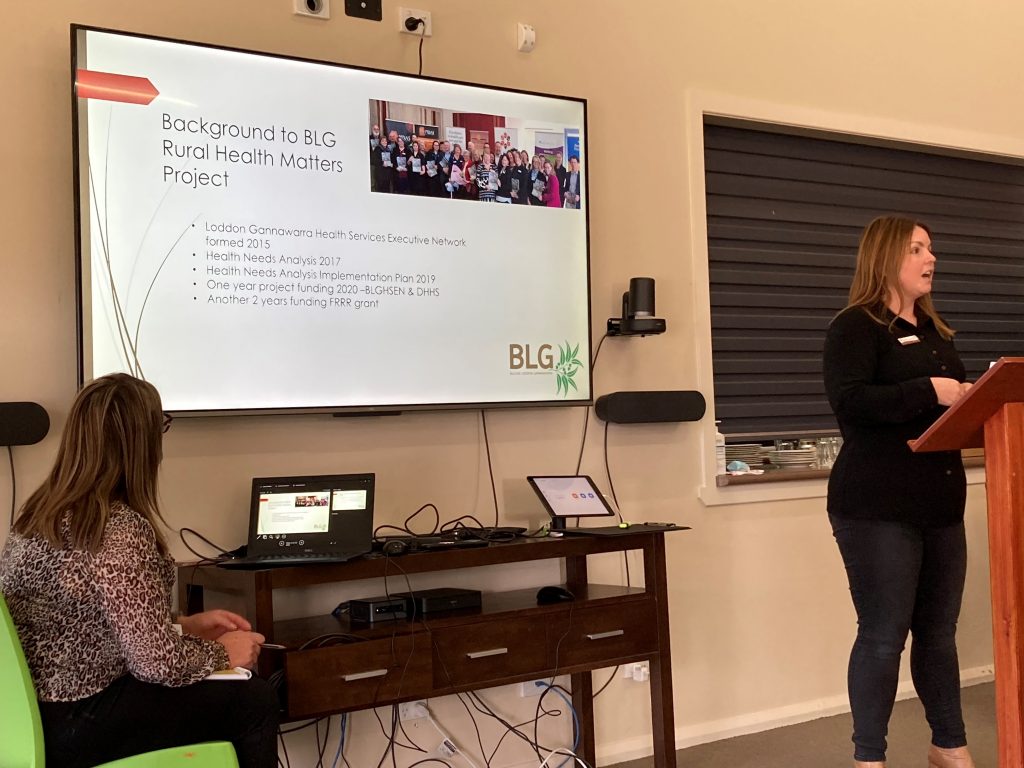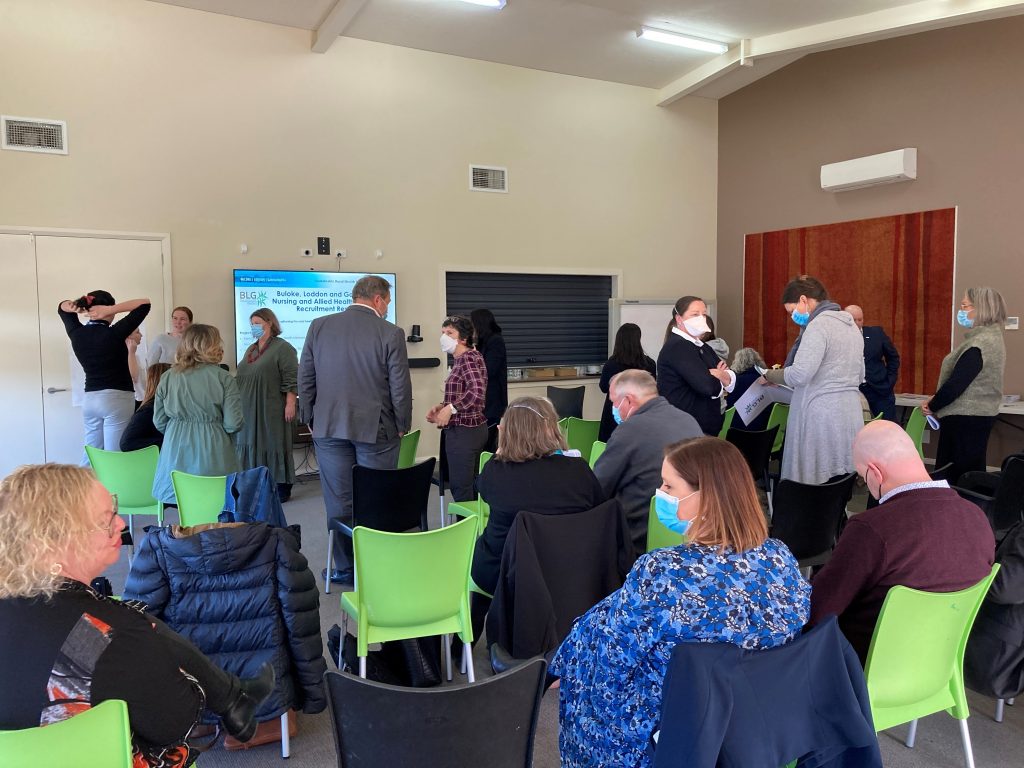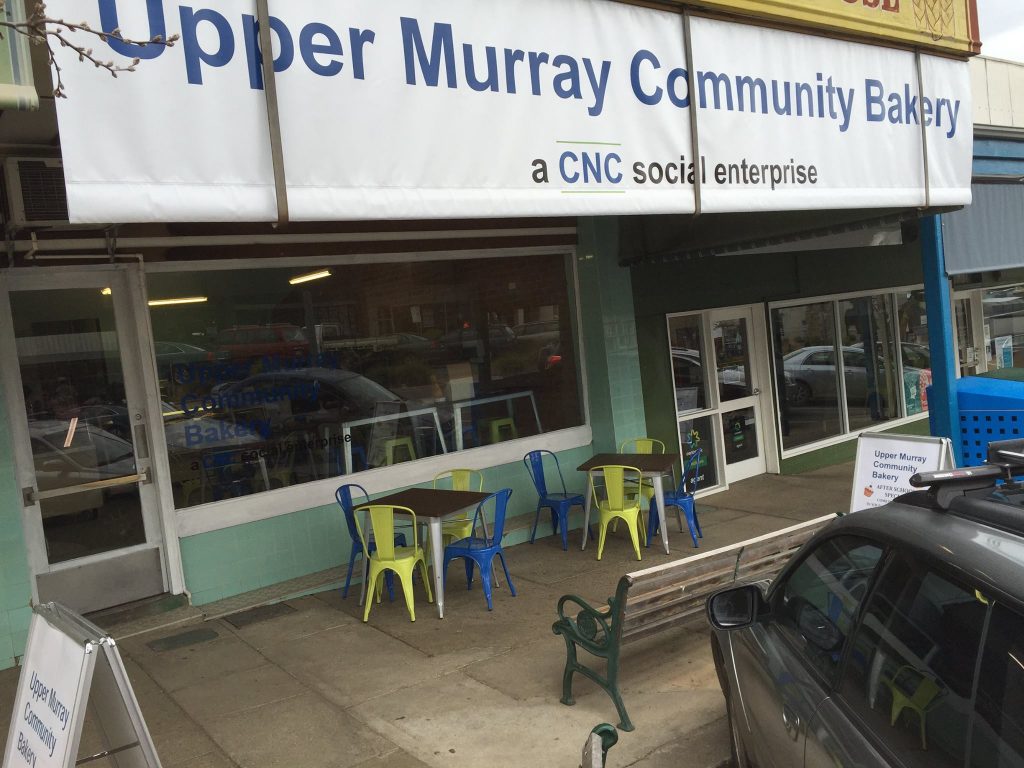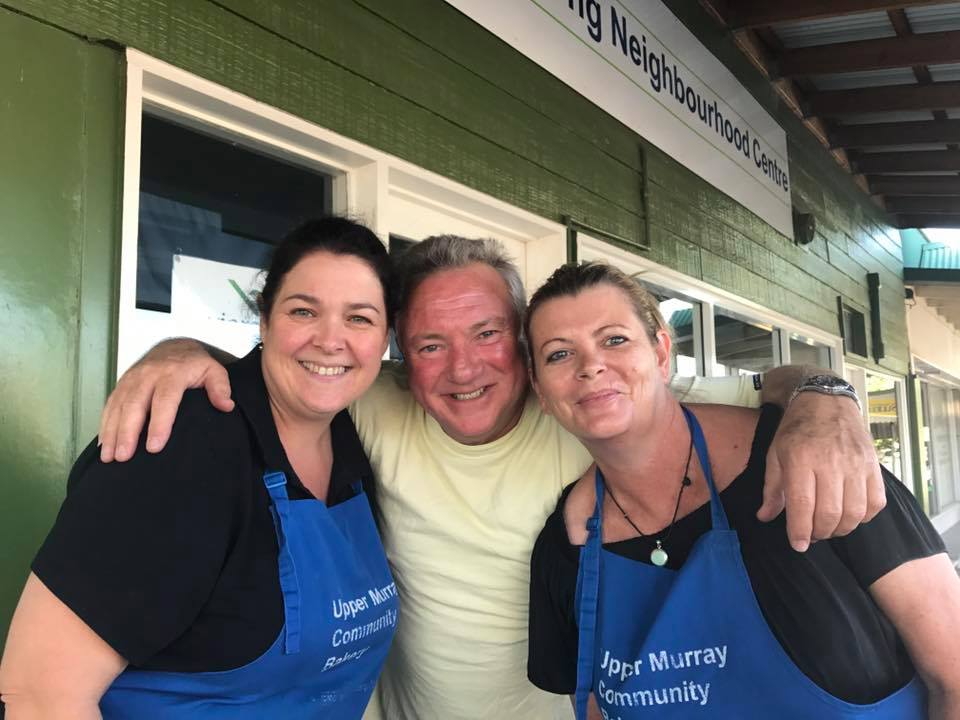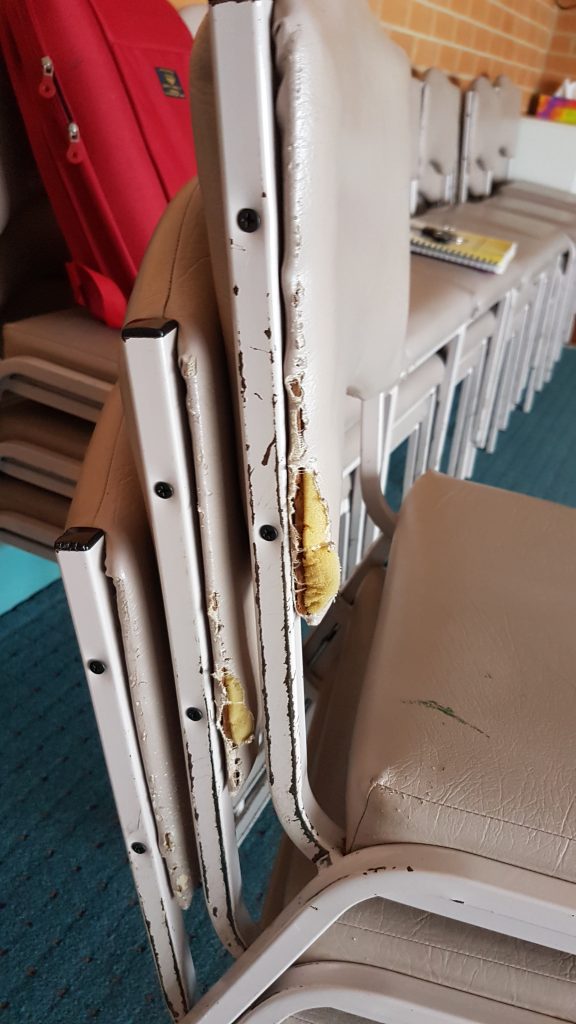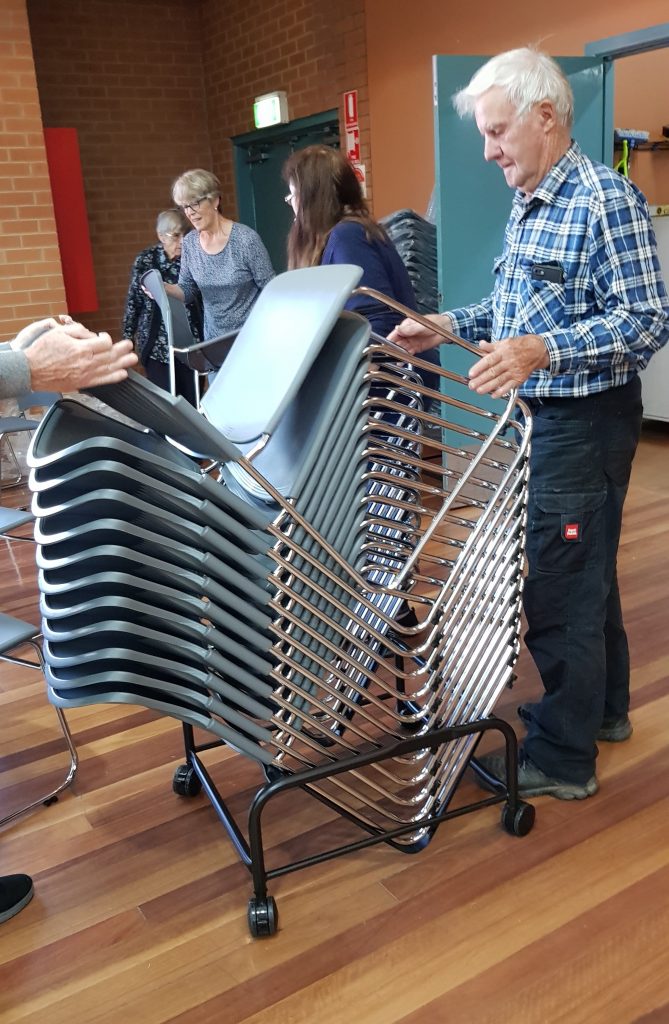Foundation for Rural & Regional Renewal (FRRR)
The Yinnar & District Memorial Hall Committee has achieved significant outcomes in improving the lives of local mature people. Led by Hall President, Glenys Webster and supported by Kathleen Millett, Specialised Exercise Therapist, the health and wellness program has created a welcoming, special place designed specifically for the needs of older people.
“You get to a certain age and you realise there is a whole group missing out.” Glenys Webster
Funded by the Victorian Bushfire Appeal Fund through several rounds of FRRR’s Grants for Resilience & Wellness program, this initiative commenced as a bushfire recovery activity following the 2009 Black Saturday fires. More than a decade on, it continues to bring local people together in an accessible and supportive environment to look after themselves, build friendships and connect with others. It has also created a local gathering point in the community for other services to connect with participants to share information and assistance, such as the provision of meals through COVID lockdowns.
The classes cater for seniors of various abilities, with the exercise specialist adapting and modifying the exercises designed for residents to remain independent and in their own homes. Tai Chi is practised each week, along with exercises involving strength, balance and mobility. Staying well and reducing injuries are among the varied topics covered through interactive sessions. Time at the end of each class for participants to have a cup of tea and connect socially is an important component of the program.
In 2019, Federation University evaluated the health and wellness program, finding that it has made a significant local impact:
- Increased social connection and sense of belonging amongst participants leading to increased mental health benefits. This program has significantly reduced isolation and loneliness, for many it’s the one activity they look forward to going to each week.
- Improvements in confidence, fitness levels and overall physical health, function and movement. This may lead to fewer hospital admissions.
- Increase in vitality and vigour and the ability of participants to remain living independently and in their own home and community.
- The program also provides an opportunity for service providers to engage with mature aged community members living remotely, learn from them and share information and resources.
(Federation University, 2019, FRRR Health and Wellness Program 2019 Evaluation Report, Collaborative Evaluation Unit)
After running for such a long time, the Hall Committee has worked out that the key ingredients for success of the program are its affordability and accessibility, as well as the fact that it runs to a regular and consistent schedule, with skilled assistance. The sharing of common issues and needs develops a sense of belonging and collective strength, recognising that recovery takes time and being socially connected to the local community is important to the short, medium and longer term recovery process.
“It’s the connection that’s really important, enjoying each other’s company and the companionship they share with each other. For some people it’s the only thing they have if they live alone… After the COVID lockdowns, we weren’t sure what was going to happen, but the first week back we had 31 people turn up! And following the floods and storms that hit this area, mental health has become an even greater concern…. they are a positive and happy group of people, they accept everyone as they are and are there for each other when times get a bit tough,” Glenys said.
This project demonstrates the central role of community organisations like the Yinnar & District Memorial Hall Committee as champions of place-based, community-led, long-term community recovery.
Health care in rural areas is so often lacking and this scarcity of services, coupled with workforce shortages, means that many chronic health conditions are poorly managed and preventative health programs can be hard to find.
That’s why our Program Coordinator, Jeanice Henderson, was excited to travel to Kerang in northern Victoria last month to learn more about the progress of the innovative Rural Health Matters project.
Funded through an FRRR Enhancing Country Health Outcomes (ECHO) grant in 2020, Northern District Community Health (NDCH) is making good use of their $115,000 grant, funded by Beyond Medical Education. They have employed Emily Wood as Buloke, Loddon and Gannawarra (BLG) Project Coordinator, and are leveraging a truly inspirational health partnership spanning three Local Government Areas and multiple health services. This collaborative placed-based, systems approach is delivering a suite of local initiatives to help improve the current and emerging health needs for BLG Shire residents.
Plans for the original launch of the Rural Health Matters project were thwarted by COVID lockdowns. However, Mandy Hutchinson, CEO of NDCH said the delays meant the August event became a real celebration of what has been achieved so far and what is to come; a chance to share and applaud the amazing work and local partnerships that are starting to shift the dial on local health outcomes.
It was easy to see from the original grant application that a lot of the hard work had already been done. The BLG Local Health Community Services had researched and created the ambitious BLG Health Needs implementation plan, and made a solid start on various projects.
The FRRR ECHO grant is helping them to take this to the next level. Emily has been tasked with mapping the current health service provision across the three Shires and identifying the existing gaps and opportunities for further collaboration. She is also responsible for running a community awareness campaign for Heart Health risk factors; developing an allied health community of practice with a focus on chronic disease management and bringing people together for an annual chronic health forum; and working closely with new initiatives such as the Sustainable Rural Health Project.
Emily said that the ECHO grant for the Rural Health Matters (RHM) project has enabled a backbone for additional work to be developed, implemented, or supported and promoted across the BLG region.
“Alongside the identified KPI’s of the RHM project, there has been the opportunity to continue facilitation of an existing Chronic Disease Management: Community of Practice (COP) for allied health professionals and nurses which had previously had facilitation funding for 12 months through Murray PHN. This role enabled not only the continuation of the COP but also allowed me to act as a conduit between the systems level planning and the on the ground experience and feedback of the allied health staff – as was the case with the Murray PHN Sustainable Rural Health project.
“I have also been able to support the application for the Smoking Research Project, which has since been funded by the Department of Health. Currently the RHM project is also supporting the facilitation of a reference group for the Smoking Research Project and the development of an EOI for the position.
“Alongside this work, the RHM project has enabled me to participate in a range of BLG network meetings involving Community Health and Health Promotion – ensuring alignment of work and priorities where possible but also avoiding duplication. I’ve also been able to support and work closely with the Murray PHN Sustainable Rural Health Project, the AgriSafe Clinics at NDCH and both the MoveIT! Project and the Healthy Heart of Victoria project in Loddon.
“Lastly, it cannot be overlooked that the meetings of the BLG for the RHM project oversight also facilitated COVID coordination and support between local health services through sharing of learnings, experiences and challenges during meetings. The ongoing opportunity for the health services across the BLG region to discuss COVID at these meetings has not only strengthened relationships but created partnerships and pathways for support that will continue to benefit the BLG community.”
Jeanice said, “It was really heart-warming to see and feel the incredible level of genuine enthusiasm and commitment in the room on the day. The depth and breadth of collaboration between the groups represented at the event was amazing, but so too their willingness to seek greater collaboration with others. It was also inspirational and affirming to hear how the ECHO grant has triggered further investment.“
Currie Park, Euroa’s retirement village, is run by the Old Colonist’s Association of Victoria (OCAV), which was established in 1896 to care for older Victorians in need. OCAV provides access to quality accommodation and care for people who could not otherwise afford it.
They received a $40,000 Caring for Ageing Rural Australians grant funded by the Ian Rollo Currie Estate Foundation to renovate and upgrade the facilities in five residential units in Euroa. The units were originally constructed in 1977, and were no longer fit-for-purpose, with the facilities being functionally out-dated and presenting a number of safety hazards.
Residents at Currie Park are aged between 68 and 92, and all suffer some form of physical illness, with many affected by arthritis and associated mobility issues. The conversion of bathrooms into wet rooms has meant that residents can now walk into the shower without having to step over the bulkhead. For those residents requiring assistance, there is now greater space for shower aids and attendants. The addition of non-slip vinyl flooring has increased the safety for residents like Ken, who had previously suffered a fall in the bathroom, but now feels much more confident navigating his surroundings.
The kitchens too also received a makeover, with the flooring also being replaced, along with new cooktops, and disability-friendly sink mixers replacing the old tapware. Shelley Calopa from OCAV commented that the renovation of units at Currie Park has directly benefited the families and care staff of the five residents whose units were refurbished, as well as the wider community, as local suppliers and tradespeople were utilised wherever possible. It is estimated that these renovations will benefit at least 25 residents in the future.
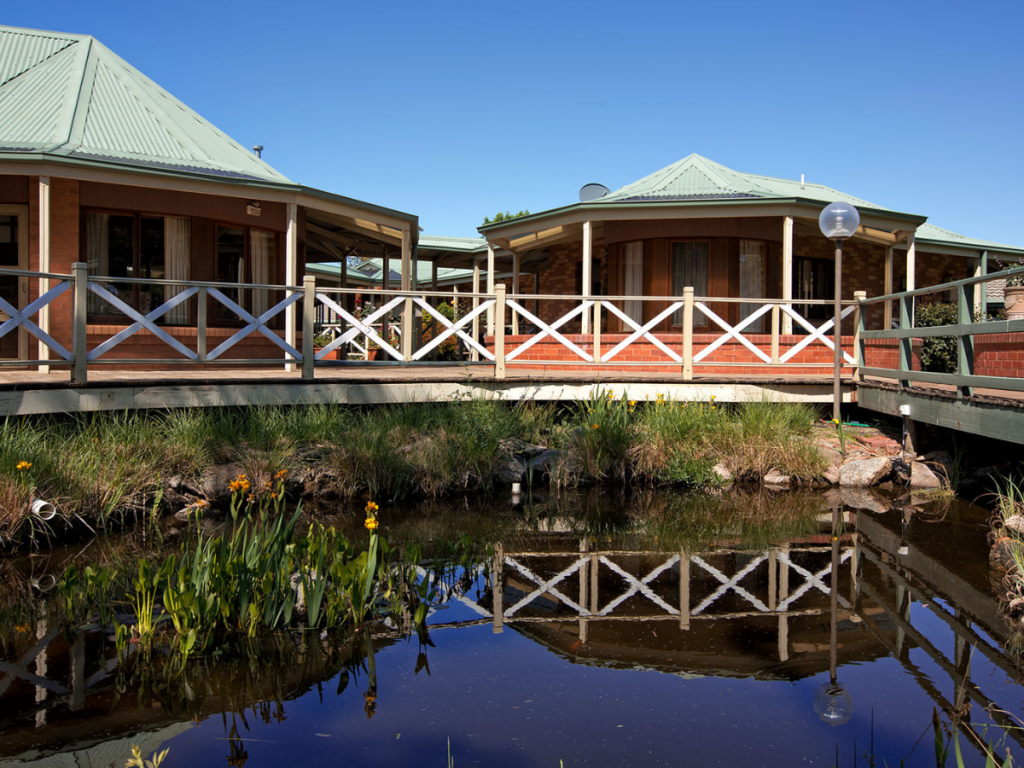
Cinema goers at the Mansfield Armchair Cinema can now enjoy outdoor movie nights thanks to newly installed weatherproof speakers funded by the Nutrien Ag Solutions Community Grants program.
The Mansfield Armchair Cinema is an award-winning community cinema that hosts local events and supports the delivery of an innovative media studies traineeship program for secondary and TAFE students from the Mansfield and Goulburn areas.
Nutrien Ag Solutions Mansfield Livestock Manager, Jamie Beckingsale, says his team is very proud to support such an important community organisation.
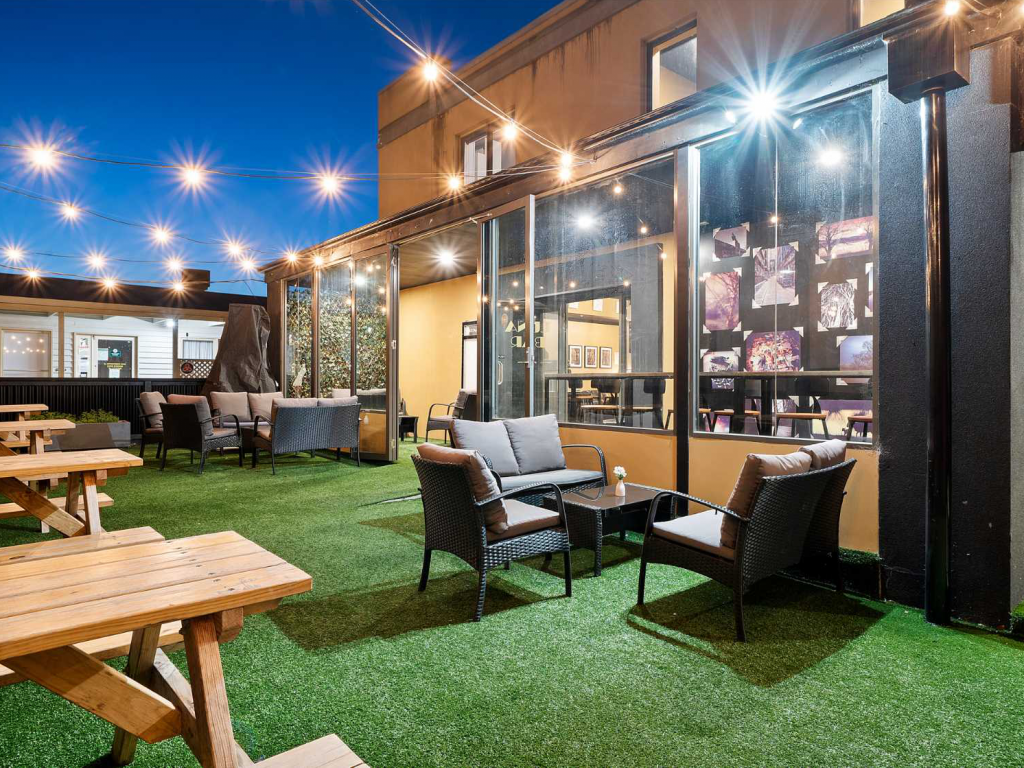
“The Mansfield Armchair Cinema is the hub of our regional community, and its volunteers give so much to our local community. So, it’s really important we do what we can to support its longevity and success,” said Mr Beckingsale.
Mansfield Armchair Cinemas’ Karen Oliver saidlocals are already making the most of the new outdoor speakers.
“Before we received the community grant, we had to carry the speakers out every time to the village green for people to enjoy the movies. Now we have permanent outdoor sounds which is just a blessing. The movies really sound great,” says Ms Oliver.
“We’ve been able to hold some fun movie nights including an 80’s themed night recently and we have a screening of Top Gun coming up, ready for the new movie to come out. The process of applying for a community grant was very straightforward, and we thank Nutrien Ag Solutions for this opportunity.”
The next round of the Nutrien Ag Solutions Community Grants program opens on the 12 of July 2022.
Twenty-one projects in Victoria’s main dairy regions – Gippsland, Northern Victoria, and South-West Victoria – have been awarded $91,833 in grants, which will help to build the capacity of local community organisations and improve digital connectivity.
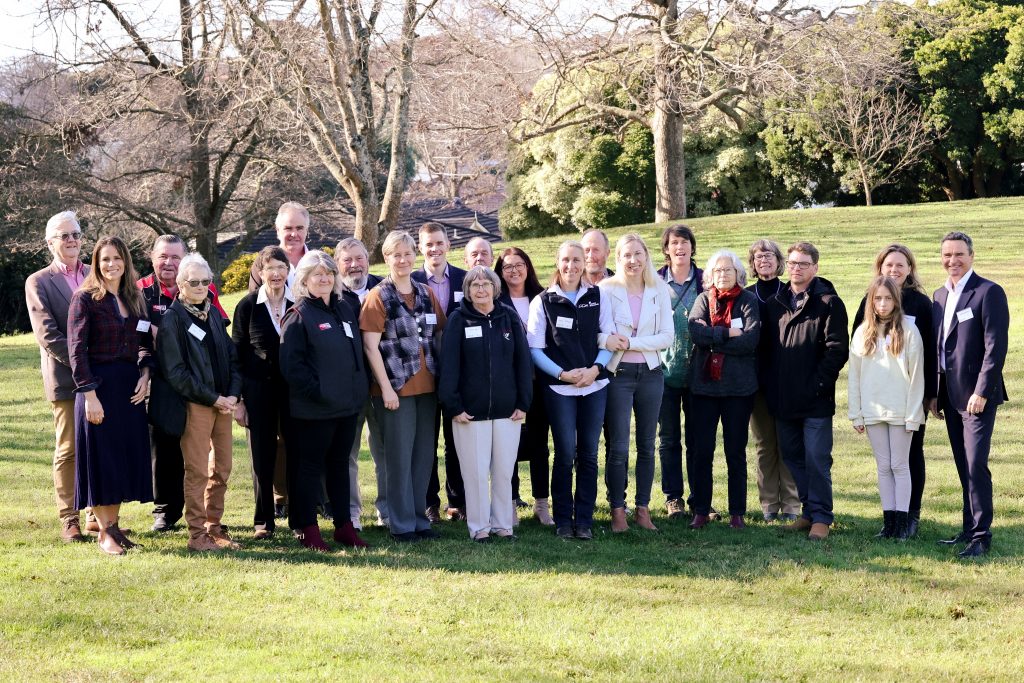
The grants are through the Gardiner Dairy Foundation Community Grants Program, which is delivered by the Foundation for Rural & Regional Renewal (FRRR). This marks the 20th year of the program, which has seen more than 500 grants awarded, valued at more than $2 million during that time.
The latest round of grants of up to $5,000 will go to grassroots organisations and not-for-profits that are critical to the sustainability of dairy farming in Victoria.
Gardiner Dairy Foundation Chief Executive, Allan Cameron, said he is delighted to continue supporting dairying communities.
“After 20 years, the Community Grants Program continues to support Victorian regions that are reliant on the dairy industry. Local groups play an important role in enhancing the vitality of these communities.
“These grants will help local organisations in many small towns to thrive with initiatives that range from COVID recovery and disaster preparedness, to improved digital capabilities and facility upgrades. The grants help to ensure the viability of these organisations,” Mr Cameron said.
Natalie Egleton, CEO of FRRR, said there was strong demand for this kind of support.
“Half of the projects receiving funding are geared towards building organisational capacity or improving access to the internet or digital technologies. This is a reflection of how the last couple of years have impacted remote, rural, and regional community groups and a great reminder of why it’s important to engage in conversations with the locals on the ground and find out how we can adapt our approach to better serve the needs of their communities.
“We are delighted to have maintained such a strong partnership with Gardiner Dairy Foundation for the last two decades,” Ms Egleton said.
Community groups were presented with their funds at a series of ceremonies held in the regions during June and July. A complete list of the projects supported is available below. They include:
- Gippsland Dairy Region – The Aboriginal Literacy Foundation Inc received $5,000 to enhance literacy outcomes for Indigenous primary school children with a dedicated tutoring program.
- Northern Dairy Region – Corryong Neighbourhood House Inc received $5,000 to grow the organisation’s capacity to support the community with the provision of computer equipment and software.
- South-Western Dairy Region – Camperdown Botanic Gardens and Arboretum Trust Inc. received $4,752 to build organisational capacity through developing digital capability that will promote and enable wide engagement with Camperdown Botanic Gardens and Arboretum.
The full list of grant recipients and their projects are below.
| Organisation | Project | Location | Grant | |||
|---|---|---|---|---|---|---|
GIPPSLAND | ||||||
| The Aboriginal Literacy Foundation Inc | Post COVID Literacy Support for Aboriginal Students in the Gippsland region | Bairnsdale | $5,000 | |||
| Camp Cooinda Incorporated | Training Safety Boat Operators for Camp Cooinda | Banksia Peninsula | $3,000 | |||
| Manna Gum Community House Incorporated | Manna Gum Gathering Place - Stage 3 | Foster | $5,000 | |||
| Neerim District Soldiers Memorial Hospital | Communication Integrity - Satellite Phone | Neerim South | $3,050 | |||
| Port Albert Maritime Museum | Letting History Speak | Port Albert | $5,000 | |||
| Toora Primary School | Netball lines in Stadium | Toora | $5,000 | |||
| Trafalgar Holden Museum Inc | Replacement of chairs | Trafalgar | $5,000 | |||
| Newry Hall Upper Maffra Mechanics Institute Incorporated | Hall Internet Connection | Newry | $3,000 | |||
| Venus Bay Tarwin Lower and District Mens Shed Incorporated | “Stop Washing Dishes by Hand and Greater Community Participation” | Venus Bay | $5,000 | |||
| Welshpool and District Primary School | IncrediGirls | Welshpool | $5,000 | |||
| NORTH EAST VICTORIA | ||||||
Corryong Neighbourhood House Inc | Digital Growth Grow the organisations capacity to support the community with the provision of computer equipment and software. | Corryong | $5,000 | |||
| Girgarre Community Centre | Building Connections with Technology Build the capacity of Girgarre Community House to increase community access to online services in collaboration with neighbouring town Stanhope. | Girgarre | $5,000 | |||
| Kyabram Development Committee Incorporated | Kyabram Tastes & Tunes Strengthen the social and economic outcomes of Kyabram through support of the Tastes and Tunes Festival. | Kyabram | $5,000 | |||
| Rochester Community House Inc | It’s Time for New Tools Improve facilities and equipment to increase participation and safety with the purchase of new tools for the Rochester Mens Shed. | Rochester | $2,900 | |||
| SOUTH WEST VICTORIA | ||||||
Anam Cara House Colac Inc | Strengthening Community Connections through Information Technology Final stage Build organisational capacity to support resident’s socialisation and staff training with Smart TV equipment. | Colac | $2,446 | |||
| Archers of Warrnambool Associated Incorporated | Combined Clubs Mower Improve equipment to support volunteer participation with a mower to maintain grounds for combined community activity and tourism. | Allansford | $5,000 | |||
| Camperdown Botanic Gardens and Arboretum Trust Inc. | Camperdown Botanic Gardens and Arboretum digital engagement project Build organisational capacity through developing digital capability that will promote and enable wide engagement with Camperdown Botanic Gardens and Arboretum. | Camperdown | $4,752 | |||
| Loved and Shared Incorporated | Loved & Shared, Establishing the Warehouse Increase organisational capacity of this start up not-for-profit group to repair and distribute nursery equipment and children’s clothing and items to the community. | Warrnambool | $5,000 | |||
| Pennyroyal Hall Committee | Pennyroyal Hall Refurbishment Improve community facilities at Pennyroyal by replastering the local hall. | Pennyroyal | $5,000 | |||
| Purnim Recreation Reserve | Upgrade Pavilion Kitchen Appliances Upgrade the kitchen facilities at the Purnim Community Recreation facility to support community events and activity. | Purnim | $3,500 | |||
| Simpson Indoor Bias Bowls Club Inc | Indoor Bowls Carpet Mat upgrade Boost volunteer vitality with the provision of replacement bowls carpet to support community activity for the Simpson community. | Simpson | $4,235 | |||
Final round of Black Saturday funding for community-led initiatives
The final round of the Grants for Resilience & Wellness (GR&W) Kinglake Ranges program opens Tuesday 5 July, with FRRR inviting applications from local not-for-profit groups. The program is designed to assist communities to rebuild, reconnect and recover from the 2009 Black Saturday bushfires.
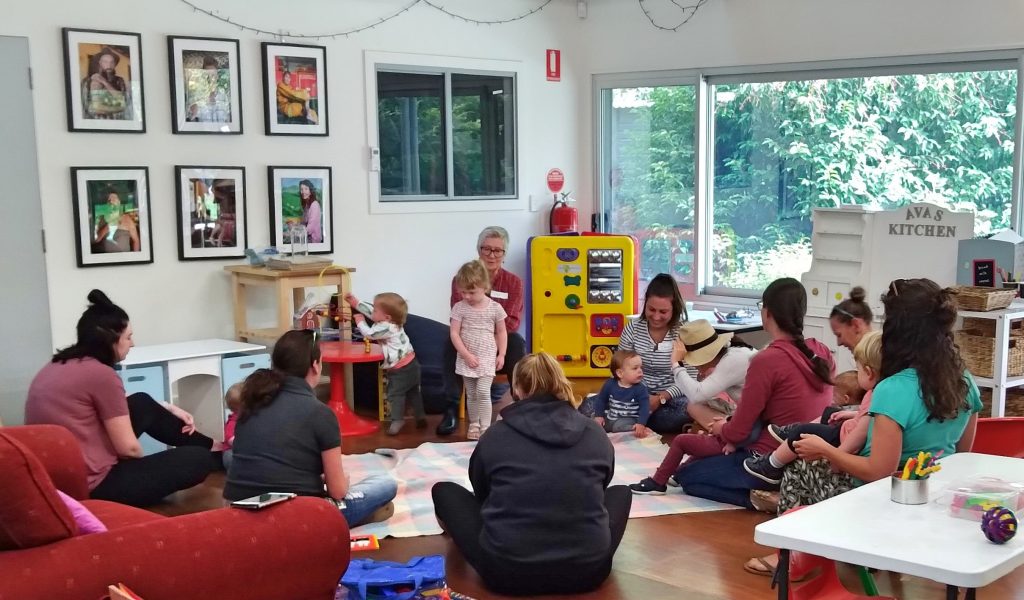
Thanks to the Victorian Bushfire Appeal Fund, funding is available to not-for-profit groups in Kinglake, Kinglake Central, Kinglake West, Pheasant Creek, Toolangi and Flowerdale. In total, there is approximately $570,000 available, with no minimum or maximum amount per grant. However, applications for more than $30,000 should be discussed with FRRR before being lodged.
Applications must be for new projects that directly assist those individuals and communities that were affected by the 2009 fires and must identify a specific hardship or distress caused by the bushfires, which the activity intends to relieve.
Nina O’Brien, FRRR’s Disaster Resilience and Recovery Lead, encouraged local communities in the Kinglake Ranges to apply now to fund their community-strengthening and resilience-building projects.
“We know that the fires had an immense impact across the Kinglake Ranges, and despite it now being more than 13 years ago, recovering communities still need support to reconnect, share experiences, enhance wellbeing and resilience and build capacity for the future.
“The community consultations during May and June were a great opportunity to hear directly from communities about how these grants can best support Kinglake’s ongoing recovery and we look forward to reading about the projects the community has prioritised,” Ms O’Brien said.
FRRR staff in Kinglake Ranges to chat about applications
FRRR team members Karly Smith-Whelan and Brooke Williams will be in the Kinglake Ranges area on Tuesday 5th (Kinglake) and Wednesday 6th July (Toolangi and Flowerdale) to chat to community groups about their project ideas. To book an appointment, email recovery@frrr.org.au or call 1800 170 020.
As a reminder, the GR&W Kinglake program has a focus on supporting projects that benefit the wider community, and applications should demonstrate community support and the involvement of a range of community groups or representatives.
Applications close Wednesday 16 August 2022, at 5pm AEST, with successful applicants announced in December 2022. For more information and the guidelines, visit https://frrr.org.au/grants-for-resilience-wellness-kinglake/ .
To date, through GR&W Kinglake, FRRR has awarded over $1.1M for 35 projects to local groups in the Kinglake Ranges. Any community impacted by 2009 bushfires and not located in Kinglake Ranges region can apply for support through FRRR’s Strengthening Rural Communities program.
Eventide Homes is a NFP organisation in Stawell, in the Northern Grampians Shire of Victoria. Founded in 1953, the organisation now offers 100 residential aged care places, from units for independent living and to 29 dementia specific beds. The 133 staff and 42 volunteers aspire to provide premium, innovative and stimulating accommodation and care.
Keeping fit and able in retirement is so important for maintaining a good quality of life. But staff realised that they needed to do more – physio and occupational therapy is provided to residents that required additional physical therapies, and gentle exercise sessions or walks in the park were on the cards but not particularly effective.
There was also the problem of falls – over a 17-month period, the organisation had seen an average of 22 reportable falls per month, and sadly, there was a fatality in 2018 due to a fall in a bathroom. Research suggests that residents of long-term aged care fall approximately three times more often than community dwellers. But frailty is preventable and treatable – with exercise. With the demand for residential aged care placements expected to treble by 2050, Eventide Homes wanted to implement best practise in falls prevention for their residents. They also knew that encouraging residents to be physically active and to build up their strength and balance would not only bring physical benefits, but also mental health benefits as well.
Citing research and population data, Eventide applied to the FRRR for their ‘Eventide Strength and Balance for Greater Mobility Project’ – to purchase fit for purpose strength and balance equipment specifically designed for aging individuals. One study concluded that a program of prescribed progressive resistance training plus balance exercises resulted in the rate of falls being reduced by 55%, and Eventide wanted to become an example of national best practise in developing a fitness and strength program for their residents. Back in 2019, they were successful in receiving a grant of $40,000 from FRRR’s larger leverage stream of Caring for Ageing Rural Australians (CARA).
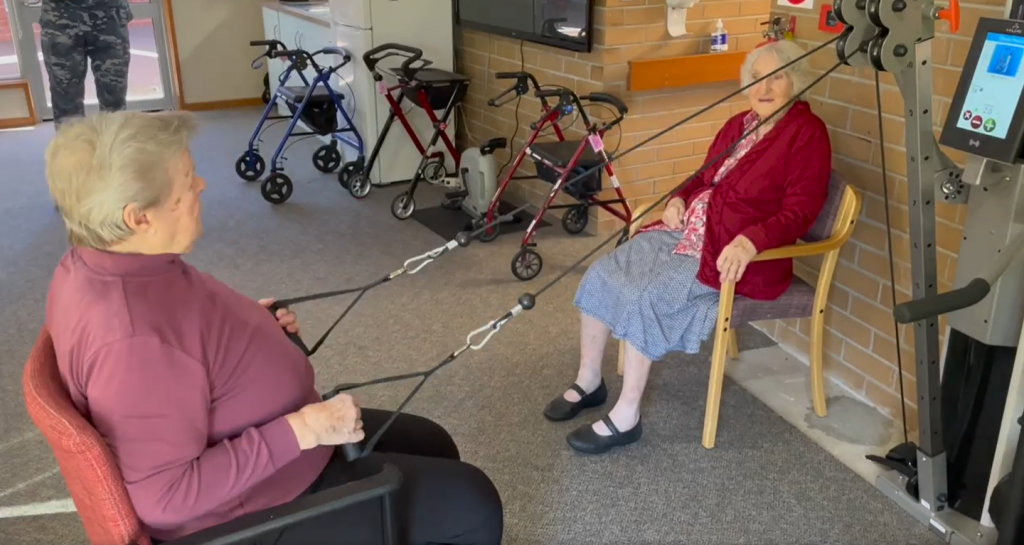
In the first months of 2020, the HUR equipment was purchased, set up, and staff trained in its use. Each resident participated in a one-hour session with an onsite physiotherapist and discussed goals to create an exercise program specific to them. Residents discussed things like being able to walk up the stairs at their children’s houses, being able to pick up objects from the floor and being able to walk without pain. Longer-term goals were broken down into smaller goals, which could be ticked-off over time, and the programs were documented in the system. With assistance from the team at HUR, Eventide staff implemented the smart touch system to automate each resident’s resistance training and monitor their sets and repetitions. This meant that clinicians could progressively increase resistance, and progress would be tracked through the system.
Sue Blakely, CEO, said they held an information session to get residents on board, and “to dispel some of the misconceptions about ageing and exercise.”
“We showed videos of 100-year-old powerlifters and residents in other homes who’ve increased their independence through strength, balance, and mobility training. We highlighted the different types of goals which people may have. After all, it may be more inspiring to be able to put on your own shoes, then pick up a kettlebell,” Sue said.
The equipment is even suitable for those residents who use wheel chairs and walking frames for mobility, as they can be assisted to sit to exercise and strengthen arms and legs.
This project will have great long term benefits into the future, as staff are able to support new residents to maintain their levels of strength, balance and fitness as they begin their residency in supported accommodation, rather than allow it to decline, which is so often the case when people enter aged care and become more sedentary.
Toni Williams, Projects & Marketing, Eventide Homes (Stawell) Inc. said “The launch of the new Eventide Homes ‘Gym’ was a hit with many residents already making the most of the new equipment. “
After just six weeks of the program, they found 8 out of 10 residents had improved their times ‘up and go’ score, by around 1 second on average. They have new residents enquiring about the program each week, and staff are excited about creating a culture of healthy movement.
“This grant and the new gym equipment has changed the fabric of our home. We intend to continue to make the most of it.”
Sue Blakely, CEO
A much-loved playgroup is going from strength to strength in the Flowerdale community in Victoria, following the engagement of a qualified facilitator to assist parents to develop their skills and confidence to support their child’s wellbeing and development. More than 20 families now participate in the facilitated weekly program, after the Flowerdale Community House received $26,000 from FRRR via the Grants for Resilience & Wellness (GR&W) Kinglake Ranges program in 2020 to engage a qualified Early Childhood Educator to plan and deliver the program. Previously, families who wished to access these services would have had to travel more than 30 km to either Kinglake or Yea.
While there were a few hiccups due to COVID lockdowns, the program has bounced back and is once again supporting children and families across the Kinglake Ranges. Led by experienced educator Jill, the program provides opportunities for parents to learn about local services, to meet with other parents for support and friendship and to build social support networks in the communities in which they live. It also provides the space for the participants, both children and adults, to forge new friendships and have fun.
“We know that relationships and community connectedness is at the heart of our community’s ongoing recovery. Playgroup plays a vital role in all communities to bring parents together, to share experiences and break down isolation; this is even more important here [in Flowerdale] as our town stretches a long distance, so meeting in the street is not a likely option as people need to travel by car to get to locations,” said Flowerdale Community House coordinator Rebekah Grant.
“The children and parents respond very well to Jill’s calm and gentle nature, and the way she is delivering advise to sooth and encourage the children is very well received.”
The Community House is an ideal location for the supported playgroup to operate from, as they are able to sustain this group long term. Now with a facilitator on board, they can provide more support to all families, as well as vulnerable and socially isolated families, to engage with others and the service.

The community of Corryong in north-eastern Victoria is nestled at the foot of the surrounding mountain ranges, and has a population of around 1,200. The Corryong Neighbourhood Centre (CNC) is very active in the community, and their mission is to make a difference for people in their community by providing a vibrant hub of lifelong learning that brings people together, connects them with services, programs, employment and activities and points them in the right direction.
The CNC operates two successful social enterprises, which not only increase the opportunities for work-based training in the community and support the ongoing operating costs of the CNC, but also meet an identified gap in current services and supplies available in Corryong.
One is a community bakery, which had an 11% increase in sales in its first year and a 28% increase in its second, contributing over $83,000 to CNC operations in its first two years of trading. The second social enterprise venture is a community garage, which uses the same model as the bakery and aims to be financially viable and self-sustaining within a reasonable timeframe. Both ventures are managed by an experienced industry professional with training skills and a community focus with business and administrative support from the CNC team.
To ensure that the funds generated from the social enterprises are sustainably and effectively utilised within the Upper Murray, the Upper Murray Innovation Foundation (UMIF) was established as a Community Foundation operated by the CNC in June 2016. UMIF partnered with FRRR in 2017 to create a Fundraising Account to channel these funds through, meaning that any contributions made to the account receive a tax deduction within Australia. UMIF’s purpose is to support the activities of the CNC and the wider Upper Murray Community through learning, activities and initiatives that improve life in the region and, particularly since the devastating Black Summer bushfires, build resilience and growth at the community level.
Since opening the account with FRRR, UMIF has raised $333,462 for bushfire recovery and $245,000 for their community garage social enterprise. Distributions are made to support community groups such as the footy clubs at Bullioh, Federal, Cudgewa and Corryong, which were adversely affected by the Black Summer bushfires. Corryong College received funding for a support dog; Cudgewa Hall for tree works; the Corryong CRC for the development of a community calendar; Biggara Recreation Reserve for community hall upgrades; and a Freemasons project to assist with the clearing of damaged fencing, erosion and damage to waterways resulting from the bushfires and subsequent landslides in difficult access areas.
Sara Jenkins from UMIF said that the funded activities have provided stand alone benefits, start up funds or contributed to larger projects for a wide range of groups. Some of the distributions have also enabled groups and organisations to work together to develop strategies and solutions to address wider community issues (e.g. the community calendar project).
When asked what some key learnings were for the Community Foundation, Sara mentioned the ongoing importance of developing and using comprehensive procedures and documentation and maintaining regular contact with recipients and partners.
“Keeping up-to-date with the status of projects, the people on the ground, and being involved in any problem solving or amendments required reduces confusion, duplication and helps the process run smoothly, despite ongoing delays,” she said.
UMIF continues to foster several project partnerships, working closely with Freemasons Victoria, Towong Shire, CRCs and various unincorporated community groups. They are also auspicing and supporting a number of bushfire recovery grants and projects for unincorporated community groups that will support the community to continue the recovery process.
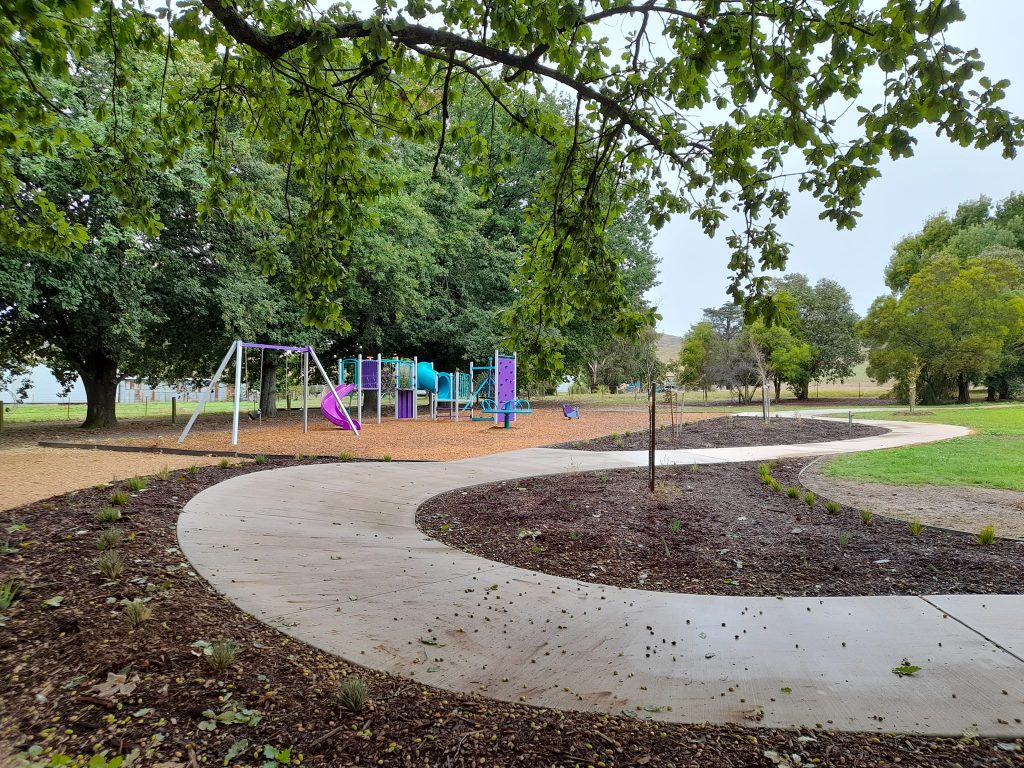
Cudgewa Park. 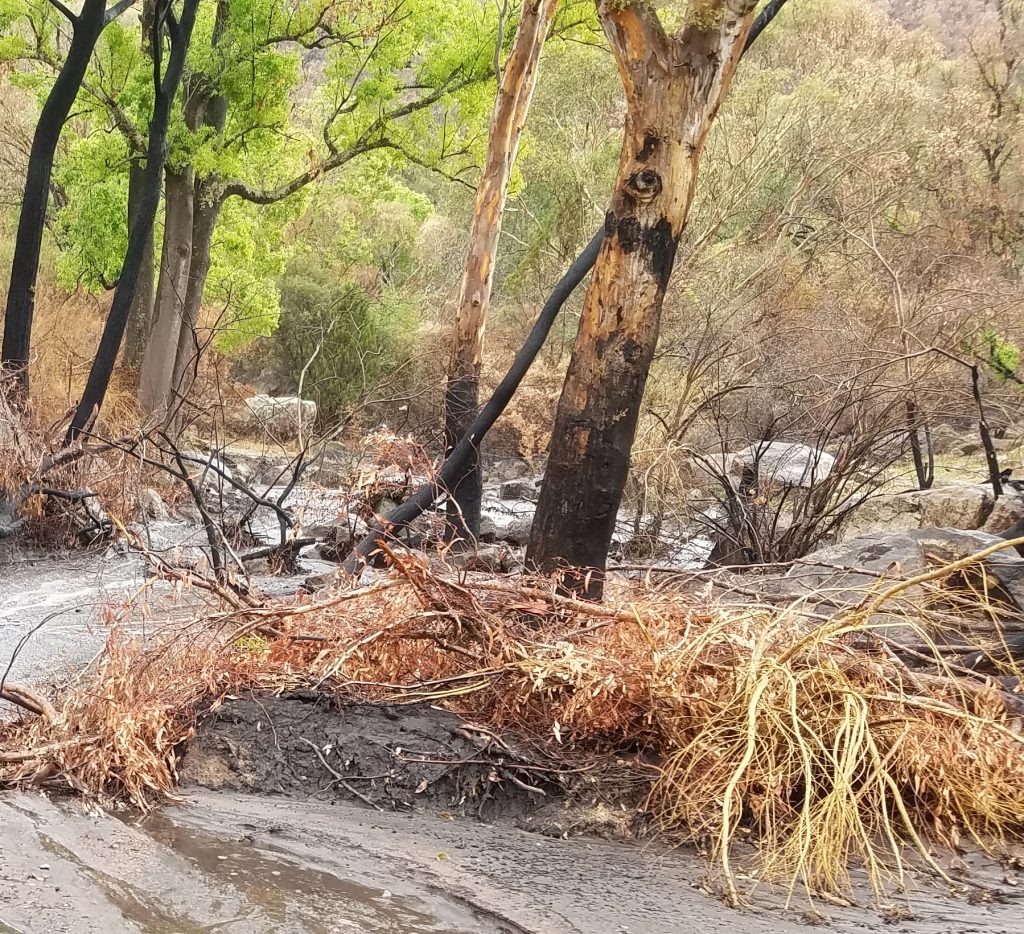
Freemasons fencing project. 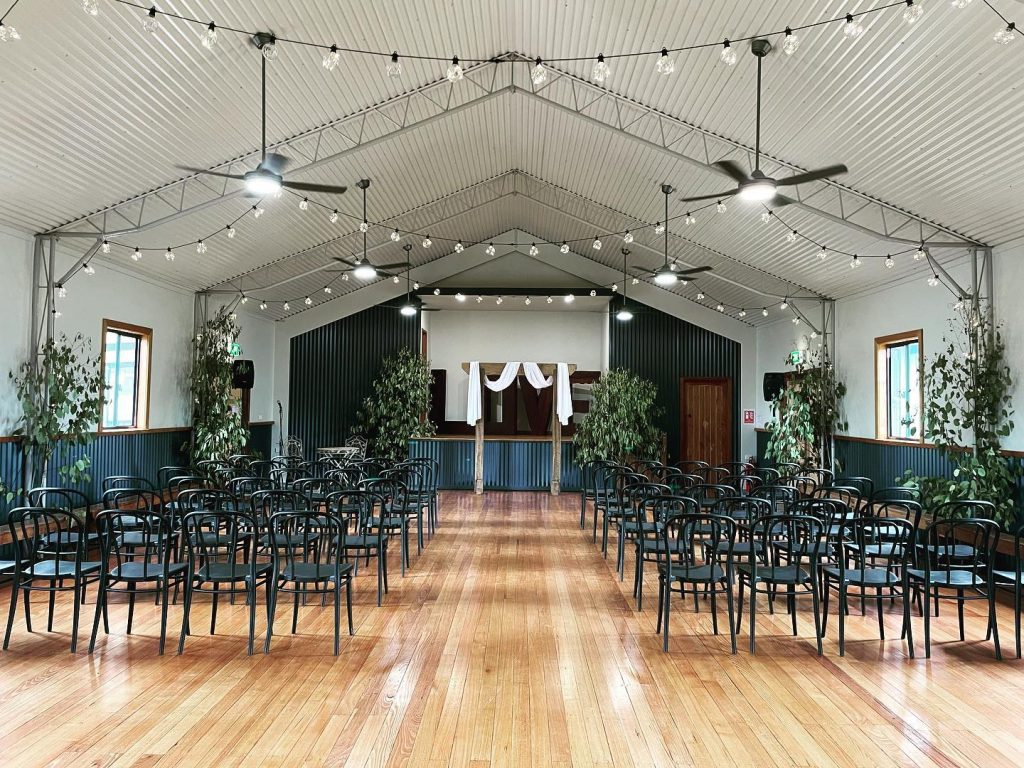
Thowgla Hall post renovations.
The FRRR team recently received some lovely feedback from the Management Committee of The Lakes Entrance Mechanics Community Hall. In 2021, they applied for a Strengthening Rural Communities grant to make upgrades to the community hall. Here’s what they had to say…
The Lakes Entrance Mechanics Hall Management Committee is delighted to announce that the new chairs, purchased with the support of a grant from the Foundation for Rural & Regional Renewal (FRRR), have arrived and are ready to use.
The Lakes Entrance Mechanics Institute Hall is the hub of community events. Ceremonies, celebrations, meetings, community clubs, federal and state elections, breakfasts, parties, dances, concerts and bingo all take place within its four walls.
Our old chairs were dilapidated, heavy, hard to stack, hard to move, and took up half of our storage space. Committee spokesperson Pennie Anderson is delighted. “I love these chairs’, she said.
“They are lightweight, ergonomic and stack easily on specially designed trolleys, so a whole stack of 20 can be moved by an average sized person. They take up half the space of the old ones in the storeroom”.
Purchased locally from Workplace Systems in Bairnsdale, the chairs have been met with approval from the regular hall users. Below are some of the comments from community members:
“They are awesome– very easy to move and set up for our productions” – Di Dixon, President, Lakes Entrance Amateur Dramatic Society
“We found the handling of the chairs a much easier exercise all round. Also, when chairs were moved around during the meeting there was not the annoying scraping noise on the floor” – Stan Barker, President, Lakes Entrance Garden Club
“They look very smart and are much quieter on the floor” – Bingo, Lions Club

